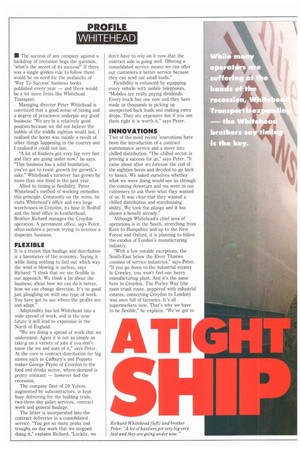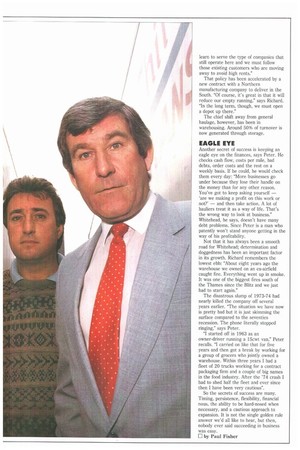• The success of any company against a backdrop of
Page 38

Page 39

If you've noticed an error in this article please click here to report it so we can fix it.
recession begs the question, `what's the secret of its success?' If there was a single golden rule to follow there would be no need for the avalanche of `Way To Success' business books published every year — and there would be a lot more firms like Whitehead Transport.
Managing director Peter Whitehead is convinced that a good sense of timing and a degree of prescience underpin any good business: "We are in a relatively good position because we did not believe the bubble of the middle eighties would last. I realised the boom was mainly a result of other things happening in the country and I realised it could not last.
"A lot of hauliers got very big very fast and they are going under now," he says. "This business has a solid foundation; you've got to resist growth for growth's sake." Whitehead's turnover has grown by more than one third in the past year.
Allied to timing is flexibility. Peter Whitehead's method of working embodies this principle. Constantly on the move, he visits Whitehead's office and two large warehouses in Croydon, its base in Redhill and the head office in Leatherhead. Brother Richard manages the Croydon operation. A permanent office, says Peter, often isolates a person trying to oversee a disparate business.
FLEXIBLE
It is a truism that haulage and distribution is a barometer of the economy. Saying it while doing nothing to find out which way the wind is blowing is useless, says Richard: "I think that we are flexible in our approach. We think a lot about the business: about how we can do it better, how we can change direction. It's no good just ploughing on with one type of work. You have got to see where the profits are and adapt."
Adaptability has led Whitehead into a wide spread of work, and in the near future it will lead to expansion in the North of England.
"We are doing a spread of work that we understand. Again it is not as simple as taking on a variety of jobs if you don't know the ins and outs of it," says Peter. At the core is contract distribution for big names such as Cadbury's and Poppets maker George Payne of Croydon in the food and drinks sector, where demand is pretty constant — however bad the recession.
The company fleet of 20 Volvos, augmented by subcontractors, is kept busy delivering for the building trade, two-three day pallet services, contract work and general haulage.
The latter is incorporated into the contract deliveries in a consolidated service. "You get so many peaks and troughs on day work that we stopped doing it," explains Richard. "Luckily, we don't have to rely on it now that the contract side is going well. Offering a consolidated service means we can offer our customers a better service because they can send out small loads."
Flexibility is enhanced by equipping every vehicle with mobile telephones. "Mobiles are really paying dividends. Every truck has one now and they have made us thousands in picking up unexpected back loads and making extra drops. They are expensive but if you use them right it is worth it," says Peter.
INNOVATIONS
Two of the most recent innovations have been the introduction of a contract maintenance service and a move into chilled distribution. "The chilled sector is proving a success for us," says Peter. "It came about after we foresaw the end of the eighties boom and decided to go back to basics. We asked ourselves whether what we were doing would see us through the coming downturn and we went to our customers to ask them what they wanted of us. It was clear that they wanted a chilled distribution and warehousing ability. We took the plunge and it has shown a benefit already."
Although Whitehead's chief area of operations is in the South, stretching from Kent to Hampshire and up to the New Forest and Oxford, it is planning to follow the exodus of London's manufacturing industry.
"With a few notable exceptions, the South-East below the River Thames consists of service industries," says Peter. "If you go down to the industrial estates in Crawley, you won't find one heavy manufacturing plant. And it's the same here in Croydon. The Purley Way (the main trunk route, peppered with industrial estates, connecting Croydon to London) was once full of factories. It's all supermarkets now. That's why we have to be flexible," he explains. "We've got to
learn to serve the type of companies that still operate here and we must follow those existing customers who are moving away to avoid high rents."
That policy has been accelerated by a new contract with a Northern manufacturing company to deliver in the South. "Of course, it's great in that it will reduce our empty running." says Richard. In the long term, though, we must open a depot up there."
The chief shift away from general haulage, however, has been in warehousing. Around 50% of turnover is now generated through storage.
EAGLE EYE
Another secret of success is keeping an eagle eye on the finances, says Peter. He checks cash flow, costs per mile, bad debts, order costs and the rest on a weekly basis. If he could, he would check them every day: "More businesses go under because they lose their handle on the money than for any other reason. You've got to keep asking yourself — are we making a profit on this work or not?' — and then take action. A lot of hauliers treat it as a way of life. That's the wrong way to look at business." Whitehead, he says, doesn't have many debt problems. Since Peter is a man who patently won't stand anyone getting in the way of his profitability.
Not that it has always been a smooth road for Whitehead; determination and doggedness has been an important factor in its growth. Richard remembers the lowest ebb: 'About eight years ago the warehouse we owned on an ex-airfield caught fire. Everything went up in smoke. It was one of the biggest fires south of the Thames since the Blitz and we just had to start again."
The disastrous slump of 1973-74 had nearly killed the company off several years earlier. "The situation we have now is pretty bad but it is just skimming the surface compared to the seventies recession. The phone literally stopped ringing," says Peter.
"I started off in 1963 as an owner-driver running a 15cwt van," Peter recalls. "I carried on like that for five years and then got a break by working for a group of grocers who jointly owned a warehouse. Within three years I had a fleet of 20 trucks working for a contract packaging firm and a couple of big names in the food industry. After the '74 crash I had to shed half the fleet and ever since then I have been very cautious". So the secrets of success are many. Timing, persistence, flexibility, financial nous, the ability to be hard-nosed when necessary, and a cautious approach to expansion. It is not the single golden rule answer we'd all like to hear, but then, nobody ever said succeeding in business was easy.
by Paul Fisher












































































